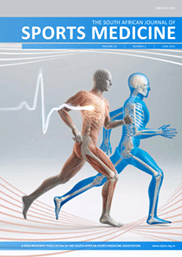Effect of caffeine ingestion on fluid balance during exercise in the heat and during recovery
DOI:
https://doi.org/10.7196/SAJSM.513Keywords:
Coffee, Diuresis, Hydration, DehydrationAbstract
Background. The effect of ingestion of a common stimulant, caffeine, on fluid balance during exercise and recovery is not fully known.
Objectives. To determine the effect of caffeine on fluid balance during exercise in the heat and during a 3-hour recovery period thereafter.
Methods. In a randomised, controlled design, caffeine-naive participants (N=8) pedalled on a bike to achieve 2.5% baseline body mass loss in a hot environment in four separate conditions: with (C+) or without (C–) caffeine ingestion (6 mg/kg of body mass) prior to exercise, followed by (W+) or without (W–) 100% fluid replenishment (water) of the body mass loss during a 3-hour recovery period (yielding C+W+, C+W–, C–W+ and C–W–, respectively).
Results. Mean (standard deviation) urine production was not different (p>0.05) regardless of rehydration status: 230 (162) mL (C+W–) v. 168 (77) mL (C–W–); and 713 (201) mL (C+W+) v. 634 (185) mL (C–W+). For the 3-hour recovery, caffeine ingestion caused higher hypohydration during rehydration conditions (p=0.02), but practically the mean difference in the loss of body mass was only 0.2 kg.
Conclusion. In practical terms, there was no evidence that caffeine ingestion in moderation would impair fluid balance during prolonged exercise in the heat or during 3 hours of recovery.
Downloads
Downloads
Published
Issue
Section
License
Copyright (c) 2014 South African Journal of Sports Medicine

This work is licensed under a Creative Commons Attribution 4.0 International License.
The South African Journal of Sports Medicine reserves copyright of the material published. The work is licensed under a Creative Commons Attribution 4.0 (CC BY 4.0) International License. Material submitted for publication in the South African Journal of Sports Medicine is accepted provided it has not been published elsewhere. The South African Journal of Sports Medicine does not hold itself responsible for statements made by the authors.
How to Cite
- Abstract 789
- PDF 622
- Figure 1 82
- Figure 2 82
Metrics

- Citations
- Citation Indexes: 2
- Usage
- Full Text Views: 1964
- Abstract Views: 269
- Captures
- Readers: 24





.png)